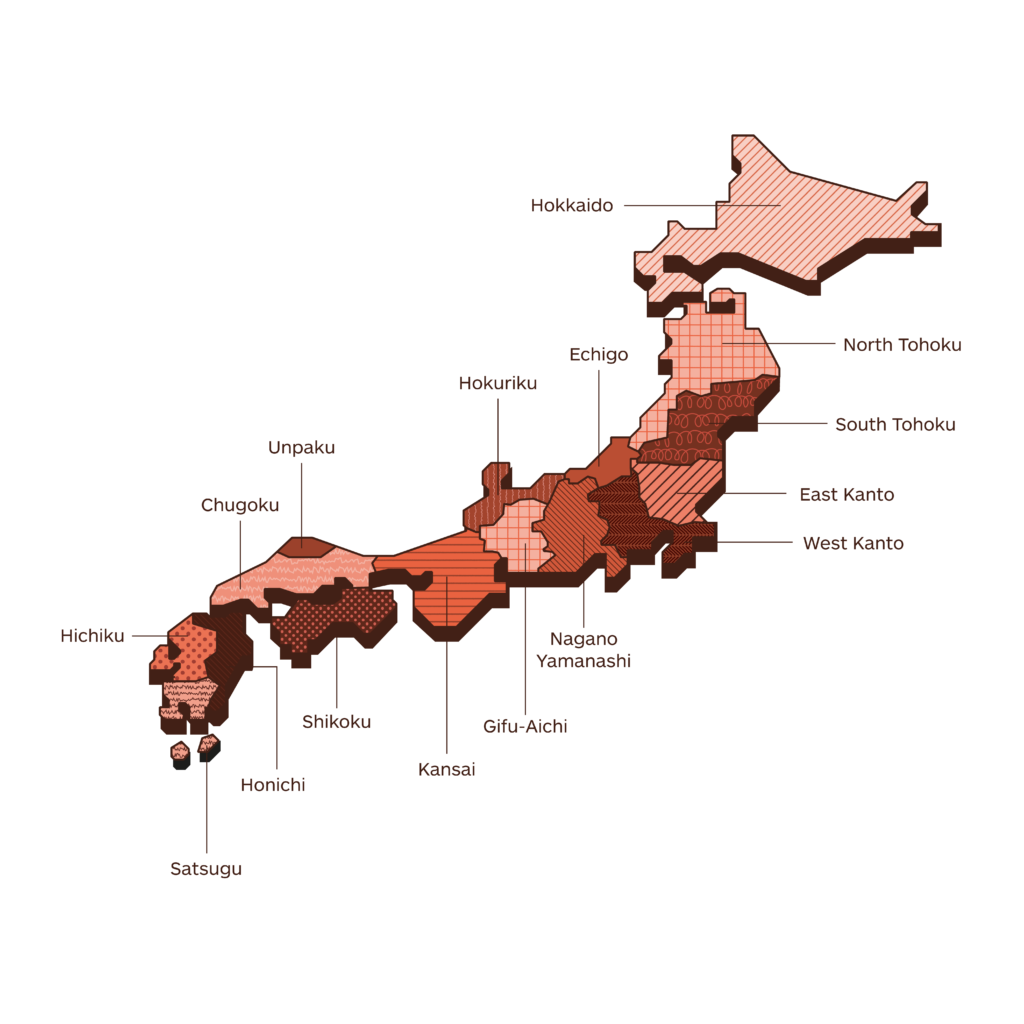Asia
To which language should you translate to localize in Japan?
What we know from our community
“Will the Japanese dialect disappear?
In Japan, Japanese is generally used, which is also a standard language based on the Tokyo dialect. And there are dialects with different intonations and flexions, and slightly different everyday expressions depending on the region. With the spread of television, locals often talk in an urban style. So has the dialect gone? It seems different in the copy of the ad. At Cobit-19, many regions created posters to encourage them to stop returning home to prevent the spread of the infection. It was made in a dialect-like copy, like the voice of a family. Also, the traditional image of the region is alive and well. Kansai is a city of commerce, and the Kansai dialect fits nicely with the lines that make things discount. Perhaps because of the influence of the yakuza movie, the dialect of Hiroshima is often used in threatening scenes. Also, the Kyoto dialect speaks slowly and relaxes the listener. The copy used in the advertisement takes advantage of these local characteristics and gives the copy a nuance different from the standard language.”
LANGUAGE INSIGHT
Official language
Japanese (99.1%)
Actual languages
Japanese (99.1%), Korean (0.5%), Chinese (0.2%), Tagalog (0.1%), English (0.1%).
What the top 150 best localized websites in the world do in Japan
(Top 150 websites listed in the Global by Design ranking – published annually by Byte Level Research, this report provides a list of globally localized websites, showcasing best practices and emerging trends in their globalization)
- 130/150 localize by translating into Japanese
- 3/150 localize by translating into both Japanese and Simplified Chinese
- 1/150 localizes by translating into both Japanese and Japanese Sign Language
- 1/150 localizes by translating into Japanese, Bahasa Indonesian, Simplified Chinese, Vietnamese, Nepali and Burmese
- 1/150 localizes by translating into Japanese, Bahasa Indonesian, Simplified Chinese, Traditional Chinese, Portuguese, Spanish, German, Italian, Russian, Hungarian, Polish, Turkish, Thai, Ukrainian and French
- 1/150 localizes by translating into Japanese, Simplified Chinese, Traditional Chinese, Korean, Portuguese, Spanish, German, Italian, Russian and French
- 1/150 localizes by translating into Japanese, Simplified Chinese, Korean, Portuguese, Spanish and French
- 1/150 localizes by translating into Japanese, Simplified Chinese and French
-
3M
-
ABB
-
Accenture
-
Adidas
-
Adobe
-
Airbnb
-
Aldi
-
Amazon
-
American Airlines
-
American Express
-
Apple
-
Audi
-
Autodesk
-
Avis
-
Bayer
-
BMW
-
Booking.com
-
Bosch
-
British Airways
-
Bumble
-
Burberry
-
BYD
-
Canon
-
Capgemini
-
Cartier
-
Caterpillar
-
Chevrolet
-
Cisco Systems
-
Citibank
-
Coca-Cola
-
Costco
-
Dell
-
Deloitte
-
Delta
-
DHL
-
Disney+
-
Dyson
-
eBay
-
Eli Lilly
-
Emirates
-
Ernst & Young
-
Facebook
-
FedEx
-
Ford
-
Four Seasons
-
Fujifilm
-
GE
-
Gillette
-
GoDaddy
-
Google
-
Gucci
-
Haier
-
Heineken
-
Hermès
-
Hertz
-
Hilton
-
Hisense
-
Hitachi
-
Honda
-
Hotels.com
-
HP
-
HP Enterprise
-
HSBC
-
Huawei
-
Hyatt
-
Hyundai
-
IBM
-
IKEA
-
Intel
-
InterContinental Hotels
-
J&J
-
Jack Daniel's
-
Jehovah’s Witnesses
-
John Deere
-
Kellogg's
-
Kia
-
KPMG
-
L'Oréal
-
Land Rover
-
LEGO
-
Lenovo
-
Lexus
-
LG
-
Louis Vuitton
-
Lululemon
-
LUSH
-
Marriott
-
MasterCard
-
McDonald's
-
Mercedes-Benz
-
Merck
-
Microsoft
-
Mitsubishi Electric
-
Nestlé
-
Netflix
-
Nike
-
Nikon
-
Nintendo
-
Nio
-
Nissan
-
NIVEA
-
Oracle
-
Pampers
-
Panasonic
-
PayPal
-
Pepsi
-
Pfizer
-
Philips
-
Pitney Bowes
-
Porsche
-
Procter & Gamble
-
PWC
-
Revolut
-
Rolex
-
Royal Caribbean
-
Salesforce
-
Samsung
-
Sanofi
-
SAP
-
Sephora
-
Shopify
-
Siemens
-
Sony
-
Spotify
-
Starbucks
-
Steelcase
-
Stripe
-
Subaru
-
Tesla
-
The Church of Jesus Christ of Latter-day Saints
-
Tiffany
-
Tinder
-
Toshiba
-
Toyota
-
TripAdvisor
-
Uber
-
United Airlines
-
UPS
-
Visa
-
Volkswagen
-
Volvo Cars
-
Vrbo
-
Walmart
-
Western Union
-
Wikipedia
-
Wise
-
WordPress
-
Workday
-
Xerox
-
Xiaomi (Mi)
-
Zara
-
Zoom
If you need others information, below you can find a selection of economic/social/cultural data
Introduction
Language
Official language
Japanese
T-index
6.1%
T-Index ranks countries according to their potential for online sales.
English
High proficiency (EF) – 78 of 112 countries/regions in the world- 13/24 position in Asia.
Demography
Capital: Tokyo
Currency: Japanese yen
Population: 126.75m
Population density: 347/km2
Economy
GDP: 4,937,421.88 trillion USD (2020)
GDP per capita: 39,285.2 USD (2020)
Exports: $623 billion (2020)
Statistics
Internet users: 94% penetration, 118.3 million
Unemployment rate: 2.8% (April 2020)
Urbanisation: 91.9% (2019)
Literacy: 99% (2019)
Conventions
Numbering system
Groups of 4 decimal numbers; comma as separator of thousands and point as decimal separator. There are two types of characters to express numbers: Standard and Kanji. For each number there are different pronunciations, according to the context.
Date format: yyyy-mm-dd / dd-mm- yyyy
Time: 24h time system
Country code: 0081
Language data sources: Worldatlas/Britannica//EF/Wikipedia; Demography data sources: IMF/Worldometers; Conventions data source: Wikipedia; Economy data sources: WTO/OEC/CIA/Esomar/Datareportal; Statistics data sources: Datareportal/WorldBank/UN/UNESCO/CEIC/IMF/Culturalatlas/Commisceoglobal
Facts and data
Economy
Imports
$581 billion (2019). Crude Petroleum ($38.4B), Petroleum Gas ($31.4B), Integrated Circuits ($17.7B), Broadcasting Equipment ($17.5B), and Computers ($14.5B), importing mostly from China ($151B), United States ($63.1B), Australia ($31.8B), South Korea ($25.1B), and Chinese Taipei ($24.3B).
Financial inclusion factors (over 15 years of age)
• 48% have an account with a financial institution
• 24% have a credit card
• 2.4% have a mobile money account
• 19% make online purchases
Ease of doing business
Very Easy to conduct business (rated 78 out of 100) 31st out of 20 Asia Pacific countries 29th worldwide out of 190 countries (2020, World Bank)
Global Innovation Index
Ranked 4th out of 17 South East Asian , East Asian and Oceanian countries, 13th out of 132 worldwide.
The Global Innovation Index captures the innovation
ecosystem performance of 132 economies and tracks the most recent global innovation trends.
Exports
$623 billion (2020). Cars ($83.1B), Integrated Circuits ($31.3B), Vehicle Parts ($28B), Machinery Having Individual Functions ($19.9B), and Photo Lab Equipment ($12.1B), exporting mostly to China ($133B), United States ($112B), South Korea ($42.9B), Chinese Taipei ($42.7B), and Hong Kong ($27.2B).
Main local online stores
Amazon, Rakuten, Yahoo Auctions Japan, Yahoo Shopping Japan, DMM.com, Mercari, ZozoTown, Wowma, Rakuma, Qoo10 Japan
Economic freedom
‘Mostly free’ (72.1 out of 100) 6th out of 39 Asia Pacific countries 30th worldwide out of 186 countries (2019, Heritage Foundation and Wall Street Journal)
Economy data sources: WTO/OEC/CIA/Esomar/Datareportal
Service Imports (2015)
Source: OEC
Service Exports (2015)
Most Complex Products by PCI
Product Complexity Index measures the knowledge intensity of a product by considering the knowledge intensity of its exporters
Source: OEC
Most Specialised Products by RCA Index
Specialisation is measured using Revealed Comparative Advantage, an index that takes the ratio between Japan observed and expected exports in each product
Source: OEC
Export Opportunities by Relatedness
Relatedness measures the distance between a country's current exports and each product, the barchart show only products that Japan is not specialized in
Source: OEC
Preferred payment methods in Japan as of June 2019
Source: MMD Labo

T-index
Reach most of the online purchasing power
T-Index ranks countries according to their potential for online sales. It estimates the market share of each country in relation to global e-commerce.
Try it nowMedia
Media language Japanese, English
Information channels
Japan’s broadcasting scene is technologically advanced and lively, with public and commercial media in keen competition. Five TV companies, including public NHK, run national terrestrial networks. Most of NHK’s funding comes from licence fees. Many millions of viewers subscribe to satellite and cable pay TV. News, drama, variety shows and sport – especially baseball – have big audiences. Imported TV shows are not widely shown, but Western influences are apparent in domestic TV fare. Newspapers are influential and highly trusted. National dailies sell in millions of copies, boosted by afternoon and evening editions. Some charge for online access. Journalists “find it hard to fully play their role as democracy’s watchdog because of the influence of tradition and business interests”, says Reporters Without Borders (RSF). But in recent years, online media and weekly news magazines have adopted a more aggressive form of political reporting, says Freedom House.
The press
Asahi Shimbun – daily, English-language pages
Yomiuri Shimbun – daily, English-language pages
Mainichi Daily News – English-language pages
Sankei Shimbun – daily
Nikkei Asian Review – English-language pages
The Japan Times – English-language
Television
NHK – public, operates General TV, Educational TV
English-language network
TV Asahi – national, commercial
Fuji TV – national, commercial
Nippon TV (NTV) – national, commercial
Tokyo Broadcasting System (TBS) – national, commercial
Radio
NHK – public, operates news/talk Radio 1, cultural/educational Radio 2, classical music-based FM Radio, external service Radio Japan
Inter FM – Tokyo commercial music station
J-Wave – Tokyo commercial music station
Tokyo FM – Tokyo commercial network
TBS Radio – operated by Tokyo Broadcasting System
News agency
Kyodo – English-language pages
Japan Today – online news, in English
Media data source: BBC
Internet Data
Internet users
94% penetration, 118.3 million
Share of web traffic by device
39.54% mobile phones, 57.69% computers (laptops and desktops), 2.63% tablet devices, others 0.14%
Median speed of mobile Internet connection
40.89 Mbps
Median speed of fixed Internet connection
93.26 Mbps
Mobile connection as a percentage of total population: 160.6%
Percentage of mobile connections that are broadband (3G-5G): 100%
Most popular web search engines
Google (74.99%), Yahoo (18.76%), Bing (5.75%), Baidu (0.21%), Duckduckgo (0.14%), Yandex Ru (0.04%)
Most used social media
Twitter(42.77%), Facebook (22.25%), Pinterest (17.92%), YouTube (9.59%), Instagram (5.61%), Tumblr (0.84%), reddit (0.56%)
Internet data sources: Datareportal/Statcounter
Social statistics
Life expectancy
84.67 yrs (2020)
Healthcare expenditure
10.9% of GDP (2018)
Glass Ceiling Index
31 out 100, ranked 28th out of 29 countries.
The glass-ceiling index measures the environment for working women combining data on higher education, labor-force participation, pay, child-care costs, maternity and paternity rights, business-school applications, and representation in senior jobs.
Average age of the population
48.4 yrs (2020)
Graduates (tertiary education)
Over half of 25-64 year-olds had attained tertiary education in 2018, 13 percentage points higher than the OECD average
Social statistics sources: WorldBank/UN/UNESCO/CEIC/IMF
Distribution of graduate university students in Japan as of May 2018
Source: UNESCO
Number of suicides per 100,000 inhabitants in Japan from 2009 to 2019
Source: National Police Agency (Japan)
Number of suicides related to problem at work in Japan from 2009 to 2018, by reason
Source: National Police Agency (Japan)
The Data Factbook is a work in progress project. Our community is helping us to fill it up always with new and updated data. Your contribution is precious. If you want to help us, please write your advices at imminent@translated.com
Languages research
Japanese dialects map

Legend
-
Hokkaido
-
North Tohoku
-
South Tohoku
-
East Kanto
-
West Kanto
-
Echigo
-
Hokuriku
-
Gifu-Aichi
-
Nagano Yamanashi
-
Kansai
-
Unpaku
-
Shikoku
-
Chugoku
-
Hichiku
-
Honichi
-
Satsugu
The geographical distribution of languages that you will find in the maps published in this section is a work in progress. Our community is helping us to fill it up with always new and updated data. Your contribution is precious. If you want to help us, please write to imminent.factbook@translated.com
Photo credit: Alexander Smagin, Unsplash


